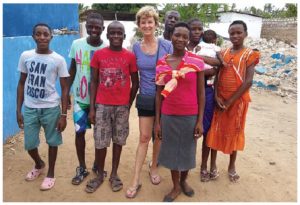
Lucy was just six years old when both her parents died from HIV/AIDS. She and her siblings, all from the coastal region of Kenya, were sent to live with their grandmother, but their grandmother was also ill and struggled to support the children. To complicate matters, Lucy’s little sister, who was infected with HIV at birth, wasn’t getting the medication she needed to fight the disease. Lucy and her siblings did their best to look after themselves and their grandmother, but the situation became increasingly difficult. Eventually neighbours intervened and the children were taken to an orphanage.
This might sound like the plot of a Dickens novel, but there are, in fact, 18.5 million orphans living like this in developing countries — children who have lost both parents or whose parents are unknown. This number is roughly equivalent to 50 per cent of Canada’s population. Some live with extended family, and a very small number are adopted either in their own country or internationally, but far too many live in orphanages, some of which can hardly afford even basic care.
This is where The Children’s Bridge Foundation (CBF) steps in. This Ottawa-based registered charity was started in 2003 by a group of adoptive parents who wanted to do something to help the children left behind in orphanages. Today, the foundation continues to be run entirely by a group of passionate volunteers, allowing more than 93 per cent of funds raised to go directly to support health and education programs for orphaned and abandoned children in Kenya, China, Zambia and, most recently, unaccompanied children from Aleppo in refugee camps.
In Kenya, the foundation helps Lucy and many other children at the GOF orphanage in Watamu, through educational sponsorships. Primary school education is free in Kenya, but government-funded schools are ill-equipped and sometimes dangerous, with class sizes of up to 100 students. To ensure the GOF children have a chance to escape poverty, the foundation provides funds for them to attend one of many local private schools. Sue Christie, president of CBF, visits the orphanage annually to meet the children and discuss their progress and plans for the coming year. CBF also gives educational support to children in Zambia, in orphanages in Lusaka and Ndola. There, CBF provides tuition, uniforms, educational materials and transport to school for the children, as well as educational resources for the early childhood learning centre.
In China, CBF supports a group of HIV-positive children who are particularly marginalized. Life in orphanages in China is hard, but for these children, it is even worse. They are frequently not allowed to eat or play with other children, and many spend their lives in isolation. The fear of contracting HIV/AIDS is so strong that often even orphanage staff members are afraid to touch them. Without human contact, these children have very little hope. To help them, CBF partnered with Elim Kids, an organization founded by two Australian doctors. They established the Elim Group Home to care for HIV-positive children from orphanages in China. There, the children are cared for in a family-style environment and receive the medical treatment and care they need to stay healthy. Providing education for the children, however, became a problem. Once the local schools discovered they had HIV, they were no longer welcome. Home schooling became a necessity. CBF stepped in to provide a teacher as well as professional development for the caregivers working at Elim, ensuring the best possible future for the children living there.
The war in Syria has produced more than 13 million refugees, six million of whom are still there. Half are children, and sadly, some of these children have been orphaned by the war, or separated from their families. An unaccompanied child in a refugee camp is at risk of becoming ill, malnourished, abused or exploited, so CBF has partnered with SOS Children’s Villages to monitor and support these children through the creation of child-friendly spaces and care centres in the refugee camps. The children receive medical care, counselling, nutritious meals, protection and a safe place to play.
Through its fundraising efforts, CBF is living up to its motto — “embrace a child, brighten a future.” To learn more about the CBF or to find out how you can help, visit childrensbridgefoundation.com or follow us on Facebook.
Sue Christie is the president of Ottawa-based Children’s Bridge Foundation. Joanne Schnurr is a director of its board.






